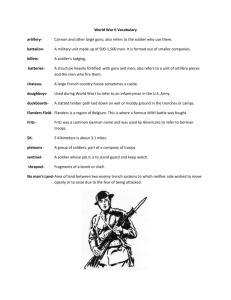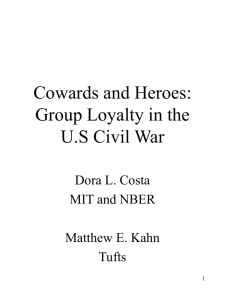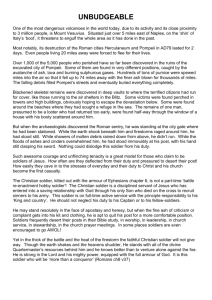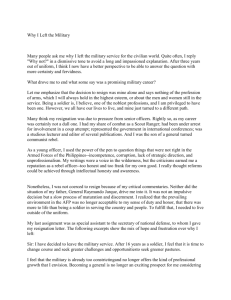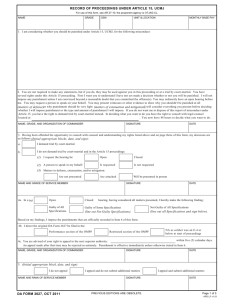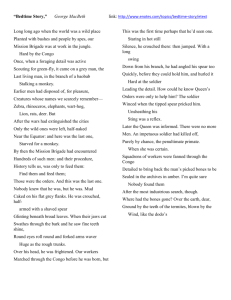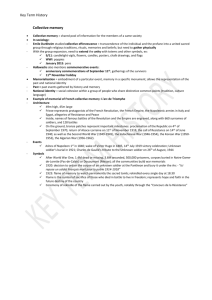Fact Sheet - Boston.com
advertisement
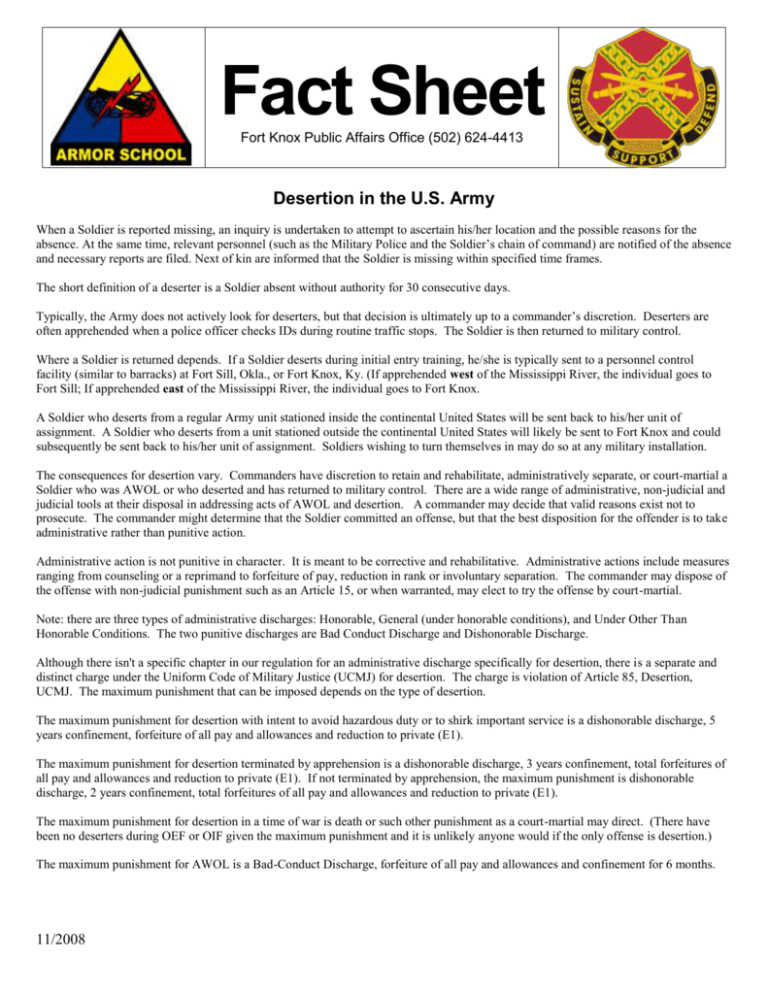
Fact Sheet Fort Knox Public Affairs Office (502) 624-4413 Desertion in the U.S. Army When a Soldier is reported missing, an inquiry is undertaken to attempt to ascertain his/her location and the possible reasons for the absence. At the same time, relevant personnel (such as the Military Police and the Soldier’s chain of command) are notified of the absence and necessary reports are filed. Next of kin are informed that the Soldier is missing within specified time frames. The short definition of a deserter is a Soldier absent without authority for 30 consecutive days. Typically, the Army does not actively look for deserters, but that decision is ultimately up to a commander’s discretion. Deserters are often apprehended when a police officer checks IDs during routine traffic stops. The Soldier is then returned to military control. Where a Soldier is returned depends. If a Soldier deserts during initial entry training, he/she is typically sent to a personnel control facility (similar to barracks) at Fort Sill, Okla., or Fort Knox, Ky. (If apprehended west of the Mississippi River, the individual goes to Fort Sill; If apprehended east of the Mississippi River, the individual goes to Fort Knox. A Soldier who deserts from a regular Army unit stationed inside the continental United States will be sent back to his/her unit of assignment. A Soldier who deserts from a unit stationed outside the continental United States will likely be sent to Fort Knox and could subsequently be sent back to his/her unit of assignment. Soldiers wishing to turn themselves in may do so at any military installation. The consequences for desertion vary. Commanders have discretion to retain and rehabilitate, administratively separate, or court-martial a Soldier who was AWOL or who deserted and has returned to military control. There are a wide range of administrative, non-judicial and judicial tools at their disposal in addressing acts of AWOL and desertion. A commander may decide that valid reasons exist not to prosecute. The commander might determine that the Soldier committed an offense, but that the best disposition for the offender is to take administrative rather than punitive action. Administrative action is not punitive in character. It is meant to be corrective and rehabilitative. Administrative actions include measures ranging from counseling or a reprimand to forfeiture of pay, reduction in rank or involuntary separation. The commander may dispose of the offense with non-judicial punishment such as an Article 15, or when warranted, may elect to try the offense by court-martial. Note: there are three types of administrative discharges: Honorable, General (under honorable conditions), and Under Other Than Honorable Conditions. The two punitive discharges are Bad Conduct Discharge and Dishonorable Discharge. Although there isn't a specific chapter in our regulation for an administrative discharge specifically for desertion, there is a separate and distinct charge under the Uniform Code of Military Justice (UCMJ) for desertion. The charge is violation of Article 85, Desertion, UCMJ. The maximum punishment that can be imposed depends on the type of desertion. The maximum punishment for desertion with intent to avoid hazardous duty or to shirk important service is a dishonorable discharge, 5 years confinement, forfeiture of all pay and allowances and reduction to private (E1). The maximum punishment for desertion terminated by apprehension is a dishonorable discharge, 3 years confinement, total forfeitures of all pay and allowances and reduction to private (E1). If not terminated by apprehension, the maximum punishment is dishonorable discharge, 2 years confinement, total forfeitures of all pay and allowances and reduction to private (E1). The maximum punishment for desertion in a time of war is death or such other punishment as a court-martial may direct. (There have been no deserters during OEF or OIF given the maximum punishment and it is unlikely anyone would if the only offense is desertion.) The maximum punishment for AWOL is a Bad-Conduct Discharge, forfeiture of all pay and allowances and confinement for 6 months. 11/2008

